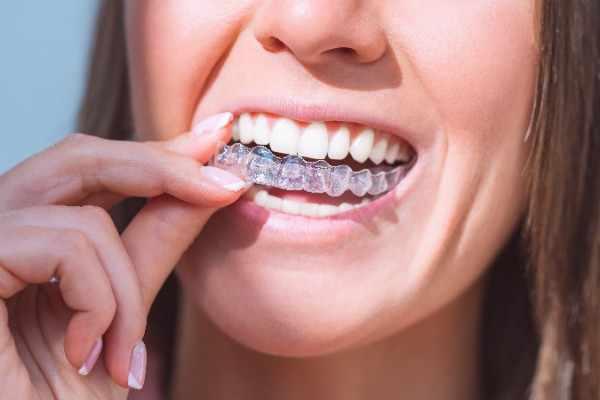Tooth Grinding With Invisalign & A Little Toothache

Wearing Invisalign aligners is a popular, discreet way to straighten teeth. However, some people may experience tooth grinding or mild toothache during treatment. These issues can be concerning, but understanding their causes and knowing how to manage them can help you maintain both comfort and progress. This article looks into why tooth grinding might occur with Invisalign, the relationship with toothache, and practical advice to keep your dental health on track.
What is Tooth Grinding?
Tooth grinding, medically known as bruxism, is the involuntary clenching or grinding of teeth. It often happens during sleep but can also occur during the day, usually linked to stress or misaligned teeth. Excessive grinding can lead to tooth wear, jaw pain, headaches, and increased tooth sensitivity. Over time, it may also cause damage to dental restorations and contribute to temporomandibular joint (TMJ) disorders, affecting overall oral health and comfort.

Why Does Tooth Grinding Occur with Invisalign?
Invisalign is designed to gently shift teeth into their proper position using clear, custom-made plastic aligners. While the treatment is effective and convenient, there are a few reasons tooth grinding might develop or worsen during the process:
- Adjustment to Aligners: Wearing Invisalign introduces a new sensation in your mouth. This unfamiliar feeling can cause some individuals to clench their jaws subconsciously.
- Bite Changes: As teeth move, your bite changes temporarily. This shift may lead to uneven pressure or discomfort, triggering grinding or clenching as your mouth adapts.
- Stress Response: Orthodontic treatment, while positive, can be stressful for some. Stress and anxiety are well-known triggers for bruxism.
Understanding these factors is key to addressing tooth grinding during Invisalign treatment.
The Connection Between Tooth Grinding and Toothache
Mild toothache during Invisalign use can sometimes be linked to grinding. When teeth are constantly under pressure or rubbed against each other forcefully, the enamel can wear down, exposing sensitive layers beneath. This may result in increased discomfort, heightened sensitivity to temperature changes, and even inflammation of the surrounding gums.
- Increased Sensitivity: Cold, hot, or sweet stimuli may cause discomfort.
- Dull Ache: A persistent toothache, often worsened by chewing or pressure.
- Jaw or Muscle Pain: Grinding can cause soreness in the muscles controlling your jaw.
However, toothache might also be related to other factors, such as the normal pressure from teeth shifting or minor irritation from the aligners themselves.
Managing Tooth Grinding While Wearing Invisalign
If you notice signs of tooth grinding during your Invisalign journey, consider these strategies to reduce discomfort and protect your teeth:
Communicate with Your Orthodontist or Dentist
Inform your private dentist in Oxford or orthodontist promptly about any toothache or grinding symptoms. They can assess your bite, check for signs of wear, and adjust your treatment plan if necessary.
Use a Nightguard
In some cases, a custom nightguard can be worn over or under the Invisalign trays during sleep. This extra layer helps cushion your teeth, reducing the impact of grinding.
Practice Stress Reduction Techniques
Since stress can exacerbate bruxism, incorporating relaxation methods such as meditation, deep breathing, or gentle exercise may help alleviate symptoms.
Avoid Chewy or Hard Foods
Minimise pressure on your teeth by avoiding tough or sticky foods, which can worsen jaw tension.
Maintain Proper Aligner Use
Follow your orthodontist’s instructions carefully. Wearing aligners consistently helps avoid prolonged bite changes that may trigger grinding.
Understanding Toothache During Invisalign Treatment
While some discomfort is normal as teeth move, persistent or sharp pain should be addressed. Common causes of toothache during Invisalign include:
- Pressure Pain: Teeth adjusting to new positions can cause temporary soreness.
- Irritation: Aligners rubbing against gums or soft tissues may create soreness or ulcers.
- Sensitivity: Shifting teeth can expose dentin, making teeth more sensitive.
- Underlying Issues: Cavities, gum disease, or existing dental problems might surface during treatment.
When to Seek Professional Help
If toothache lasts more than a few days, worsens, or is accompanied by swelling or bleeding, consult your private dentist in Oxford immediately. Prompt professional assessment and treatment can prevent serious complications, including infection and further dental damage.
Preventing Tooth Grinding and Toothache with Invisalign
Being proactive can reduce the risk of grinding and discomfort:
|
Prevention Tips |
Explanation |
|
Follow Invisalign Instructions |
Adhere strictly to your treatment schedule and care guidelines. |
|
Attend Regular Check-Ups |
Routine monitoring helps detect and manage issues early. |
|
Keep Teeth and Aligners Clean |
Good oral hygiene reduces irritation and infection risks. |
|
Use a Soft Toothbrush |
Minimises gum irritation during treatment. |
|
Stay Hydrated |
Drinking water supports oral health and saliva production. |
Benefits of Invisalign Despite These Challenges
Despite potential minor issues like tooth grinding or mild toothache, Invisalign offers numerous advantages over traditional braces:
- Nearly Invisible: Clear aligners provide discreet treatment.
- Comfortable Fit: Smooth plastic reduces gum irritation compared to brackets and wires.
- Removable: Easy to remove for eating and cleaning, maintaining better oral hygiene.
- Effective: Proven to correct a variety of alignment problems efficiently.
Being aware of possible side effects and working closely with your dental care provider ensures a smoother treatment experience.
Finding the Right Specialist in Oxford
If you are concerned about tooth grinding or discomfort with Invisalign, consulting a private dentist in Oxford experienced with clear aligners is essential. Professionals familiar with invisalign Oxford treatment can provide tailored advice, identify complications early, and offer solutions such as customised nightguards or treatment adjustments.
Choosing a reputable clinic guarantees the highest standard of care, helping you achieve your smile goals safely.

Conclusion
Tooth grinding and a little toothache during Invisalign treatment can be challenging, but they are manageable with the right approach. Awareness, communication with your dentist, and proper care are vital to reducing discomfort and protecting your teeth.If you are undergoing Invisalign treatment in Oxford or considering it, ensure you work with experienced professionals who understand these concerns and can guide you through any difficulties. At EDO, we prioritise your comfort and dental health while helping you achieve a confident, beautiful smile.
- Art
- Causes
- Best Offers
- Crafts
- Dance
- Drinks
- Film
- Fitness
- Food
- Jogos
- Festival
- Gardening
- Health
- Início
- Literature
- Music
- Networking
- Outro
- Party
- Religion
- Shopping
- Sports
- Theater
- Wellness



